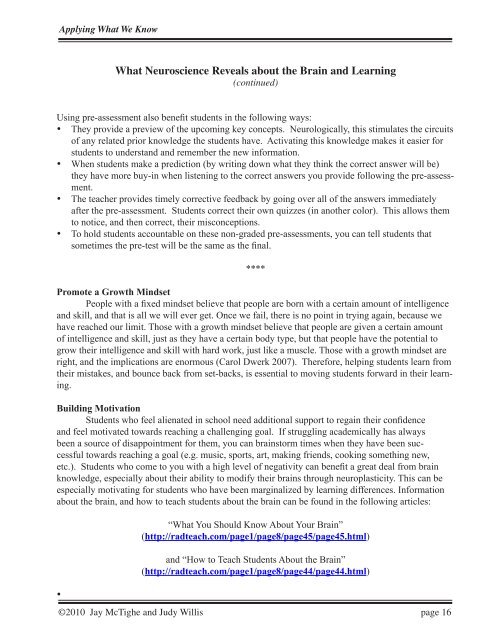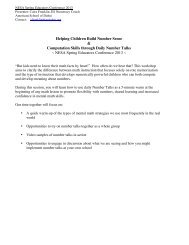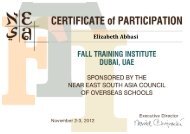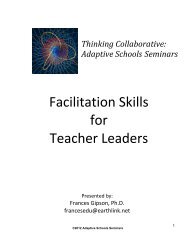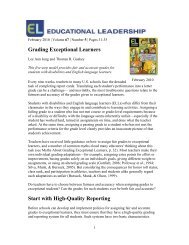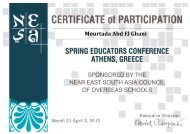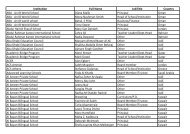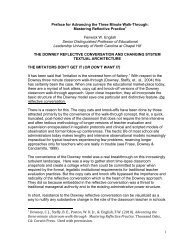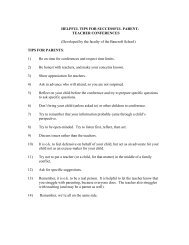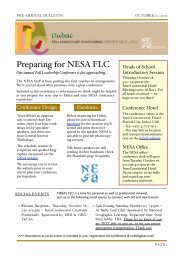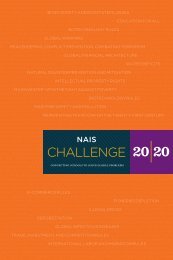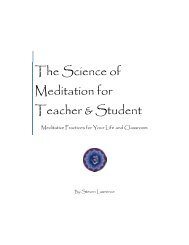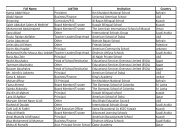Joint Presentation with Judy Willis - NESA
Joint Presentation with Judy Willis - NESA
Joint Presentation with Judy Willis - NESA
You also want an ePaper? Increase the reach of your titles
YUMPU automatically turns print PDFs into web optimized ePapers that Google loves.
Applying What We Know<br />
What Neuroscience Reveals about the Brain and Learning<br />
(continued)<br />
Using pre-assessment also benefit students in the following ways:<br />
• They provide a preview of the upcoming key concepts. Neurologically, this stimulates the circuits<br />
of any related prior knowledge the students have. Activating this knowledge makes it easier for<br />
students to understand and remember the new information.<br />
• When students make a prediction (by writing down what they think the correct answer will be)<br />
they have more buy-in when listening to the correct answers you provide following the pre-assessment.<br />
• The teacher provides timely corrective feedback by going over all of the answers immediately<br />
after the pre-assessment. Students correct their own quizzes (in another color). This allows them<br />
to notice, and then correct, their misconceptions.<br />
• To hold students accountable on these non-graded pre-assessments, you can tell students that<br />
sometimes the pre-test will be the same as the final.<br />
****<br />
Promote a Growth Mindset<br />
People <strong>with</strong> a fixed mindset believe that people are born <strong>with</strong> a certain amount of intelligence<br />
and skill, and that is all we will ever get. Once we fail, there is no point in trying again, because we<br />
have reached our limit. Those <strong>with</strong> a growth mindset believe that people are given a certain amount<br />
of intelligence and skill, just as they have a certain body type, but that people have the potential to<br />
grow their intelligence and skill <strong>with</strong> hard work, just like a muscle. Those <strong>with</strong> a growth mindset are<br />
right, and the implications are enormous (Carol Dwerk 2007). Therefore, helping students learn from<br />
their mistakes, and bounce back from set-backs, is essential to moving students forward in their learning.<br />
Building Motivation<br />
Students who feel alienated in school need additional support to regain their confidence<br />
and feel motivated towards reaching a challenging goal. If struggling academically has always<br />
been a source of disappointment for them, you can brainstorm times when they have been successful<br />
towards reaching a goal (e.g. music, sports, art, making friends, cooking something new,<br />
etc.). Students who come to you <strong>with</strong> a high level of negativity can benefit a great deal from brain<br />
knowledge, especially about their ability to modify their brains through neuroplasticity. This can be<br />
especially motivating for students who have been marginalized by learning differences. Information<br />
about the brain, and how to teach students about the brain can be found in the following articles:<br />
•<br />
“What You Should Know About Your Brain”<br />
(http://radteach.com/page1/page8/page45/page45.html)<br />
and “How to Teach Students About the Brain”<br />
(http://radteach.com/page1/page8/page44/page44.html)<br />
©2010 Jay McTighe and <strong>Judy</strong> <strong>Willis</strong> page 16


